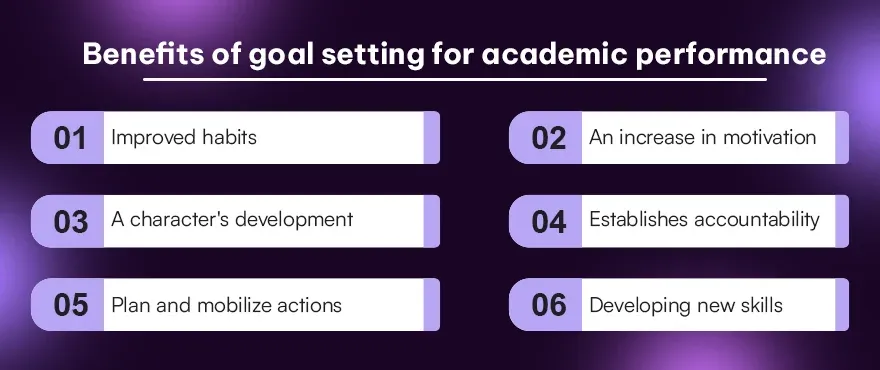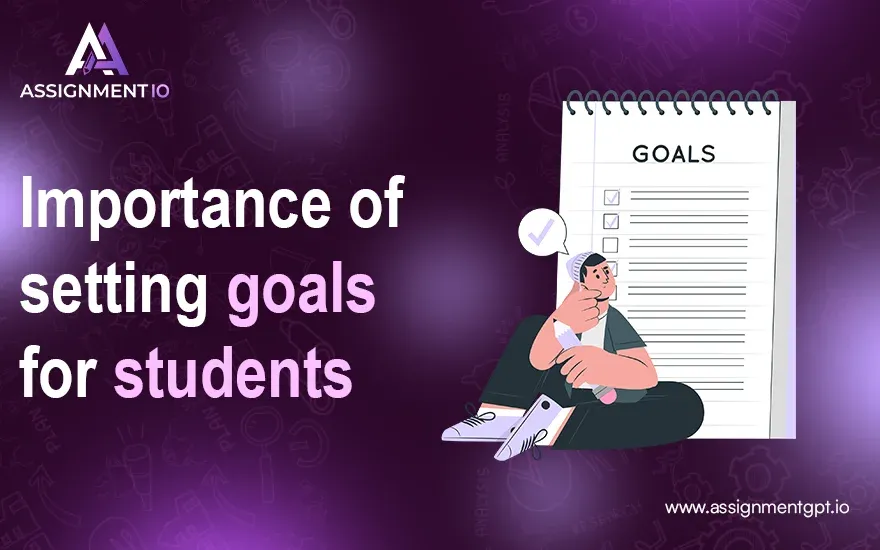Importance Of Setting Goals For Students

Vikas Kukadiya
Goal setting is an incredibly powerful and essential skill that greatly benefits students. In a world full of distractions and competing demands, a clear set of goals guides the focus and gives students direction for what's most important. Goals are more than a decision about what one wants to achieve; they create a plan that calls for action in pursuit of personal and academic growth. Clear objectives allow the students to achieve good academic standards, productive habits, and remain productive even in the face of challenges. This can become a reality from one's dreams, and therefore, through clear objectives, the groundwork is set for the future by the student.
Beyond academics, goal setting is helpful for personal growth; it promotes a sense of accountability and fosters necessary skills in life. Developing early goal-setting habits may also help students acquire resilience, good time management, and confidence that long lasts beyond the students' graduation. Setting the goal to improve grades, develop better study habits, or even acquire new skills gives room for a student to maximize their potential and make tremendous growth in their personal journey and academic life.
Quick Summary
Goal setting can help students find direction for both academic and personal journeys. It boosts motivation, encourages a sense of accountability, and can even improve time management and organizational skills, all factors helpful for overall success and achievement at school and in life. The process of setting and striving for goals can build resilience and concentration in students, allowing them to push through difficulties and develop a growth orientation. Indeed, setting goal leads to changes in students' lives, transforming them into taking tangible steps in all walks of life and building a solid foundation for future success.
Why Is Goal Setting Important?
Goal setting is basic in the personal and academic development of a student. Here are the reasons why this becomes important to you:
1. Provides Direction and Focus: Goals provide students with a roadmap or guide that helps them direct effort towards attainable and worthwhile outcomes.
2. Boosts Motivation and Persistence: Goals help students stay motivated even when dealing with adverse academic or personal challenges.
3. Develop Time Management Skills: Through goals, students can learn to timely organize their work and plan the tasks and consequently enhance their level of productivity and organization.
4. Boosts Self-awareness: This is achieved through the formulation of goals wherein students learn about their strengths, weaknesses, and interests and support personal growth and informed decision-making.
5. Confidence and Self-Efficacy: Achievement of goals boosts self-confidence and enables the learners to take up more challenging tasks.
6. Promotes Responsibility: The stated goals will encourage the establishment of responsibility for the actions taken and the development of maturity and independence.
Also read the article : Time Management for Busy Students
What Benefits Does Goal-Setting Bring to Academic Performance?

1. Improved Habits: Goal setting makes a student develop good habits that improve academic performance directly. A student who has clear goals is likely to develop many positive habits, such as frequent study sessions and proper task prioritization.
2. Increased Motivation: Goals give students something to work for, thereby increasing motivation. A well-defined objective gives a sense that can make sure the student stays in class all the way, even when he faces several roadblocks.
3. Developing Character: Setting and working towards goals develops essential qualities such as discipline, resilience, and perseverance. This character helps students throughout their lives while they are working towards their objectives.
4. Instills Accountability: Goal setting lets the students be accountable towards their progress. Student's actions and performance are followed and come to a stage of responsibility that is developed through it.
5. Sets and Mobilizes Action: Goals represent a way of planning- breaking work into action steps to be controlled. This entire process guides students in taking proper and well-organized action toward achieving the expected outcomes.
6. Building New Abilities: Another aspect of achieving goals involves creating new abilities or gaining new know-how. The process of achieving objectives is unconscious, without a conscious intention, as students develop their capabilities and skills.
Now Is the Time for Students to Start Setting Goals
Setting goals is definitely one of the good habits anyone can have, and when started as a student, they especially yield great results. Below is the reason why this is the best moment for a start:
1. Good Platform for Further Prosperity: Goal setting as a student creates necessary groundwork with building of basic skills, resilience, and confidence needed to tackle any further challenges on the road to school or later work.
Promotes Active Learning: Achieving goals motivates students to take responsibility for their learning and makes them more proactive about what they learn. The student becomes more participative and motivated.
2. Builds Confidence with Small Wins: Small victories build momentum and breed confidence in students that propel them toward setting and achieving larger goals.
3. Develops Self-Discipline and Responsibility: Goal setting and working toward goals develop the disciplines and accountabilities that are so important not only in academic learning but also in the personal lives of individuals.
4. Boosts Problem-Solving Skill: Students who set goals often build better problem-solving skills due to learning techniques on how to cope with problems that may arise along the path to their goals.
5. Promotes Lifelong Learning and Adaptability: Goal setting encourages a habit of continuous self-improvement and adaptability, preparing students for a dynamic, ever-changing world.
Practical Rules to Establish Goals
To make goal setting successful, students can follow these practical rules:
1. Set SMART Goals: SMART is an acronym for Specific, Measurable, Achievable, Relevant, and Time-bound. This gives clarity and structure to the goals so that they are more achievable and meaningful.
2. Divide Big Goals into Small Steps: Big goals are sometimes overwhelming. However breaking them into smaller manageable tasks makes it easier for students to feel motivated towards completing those tasks.
3. Prioritize Goals According to Priority: Students must set high-priority goals that are in accordance with their personal values and academic objectives.
4. Short-term and Long-term Goals: Short-term gives students immediate goals, while setting long-term goals gives them a future vision to keep the student focused on the tasks at hand and the aspirations of the future.
5. Regular Review and Reflection: Checking regularly helps the student remain on track, make necessary adjustments, and celebrate achievements.
6. Reward Achievements: The ability to identify progress and reward achievements encourages well-behaved behaviour as students become motivated and enthusiastic towards attaining set goals.
Conclusion
Goal setting allows students to focus, get motivated, and take responsibility for their own learning and academic progress. Goal setting inspires the student to develop positive habits, enhance one's ability to manage time effectively, and provides a good foundation for long life success. Tools such as AssignmentGPT IO will guide the student on that road and offer the necessary resources and information needed to prepare, outline, and realize educational goals.
By setting realistic goals, and then working hard to achieve them, students develop confidence and acquire very important skills. At the same time, as they progress further, there's an absolute possibility that they'll enhance their chances of full potential in academics as well as in personal development. A habit of goal setting helps achieve the right balance in success for the students and gives them tools to design a successful and fulfilling life.
FAQs
1. Why are goals important to students?
Goals make students feel oriented, motivated, and on the right track in terms of what they would like to achieve in both academic and personal aspects.
2. How do academic goals help out the students?
Academic goals enable students to majorly focus on their studies, manage time perfectly, and achieve motivation toward reaching their real potential.
3. What are examples of student goals in life?
Examples may include obtaining a good GPA, establishing positive study habits, forming relationships, and establishing groundwork for future career goals.
4. What are the benefits of goal setting for college students?
Goal setting can help balance coursework, develop professional skills, and really make progress toward one's career goals.
5. Why is it important to set short-term and long-term goals?
The short-term goals include all the immediate milestones; long-term goals have a vision for the future, which helps a student focus on achieving both current and future success.
Latest Blog's

AI Homework Helpers offer fast solutions, personalized learning, and round-the-clock study support for students in every subject.


Master exams with superior scores and less study time. Step-by-step tips using ChatGPT, Khanmigo, and Quizlet.


AI homework helpers streamline research, writing, and studying so students learn faster and complete assignments with less stress.


Master exams with superior scores and less study time. Step-by-step tips using ChatGPT, Khanmigo, Quizlet.


How deep learning makes AI homework helpers smarter, faster, and more personalized for students.


How AI homework helpers save time, boost learning, and provide personalized study support.

